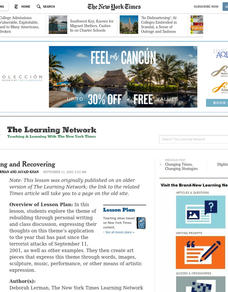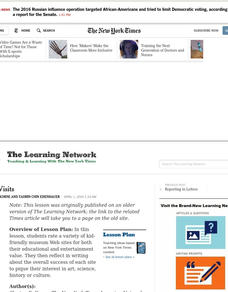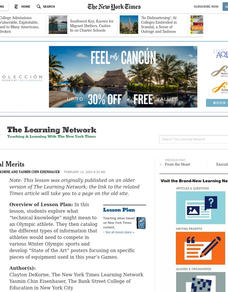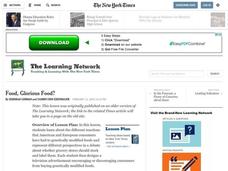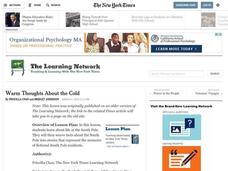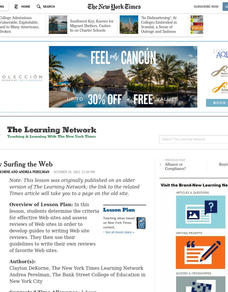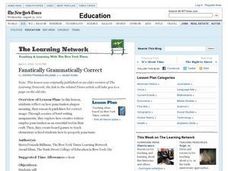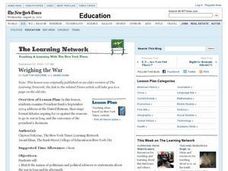Curated OER
The Cutting Edge
Young writers examine the writings of Raymond Carver to investigate editing skills. They will develop original sentences. Then read the work of Raymond Carver to edit and analyze the ending. They revise and ending of their original...
Curated OER
The Jacket: Journal Templates Teacher's Guide
Explore this story involving prejudice and racism to enhance learners' comprehension skills. The story The Jacket by Andrew Clements involves an African American boy who is falsely accused of stealing someone's jacket. This teacher's...
Curated OER
Juan Verdades
Cement comprehension skills using the strategies in this activity. After reading the story, Juan Verdades by Joe Hays, learners use context clues to answer questions, identify main ideas and details, and sequence events.
Curated OER
Pop on the Block
Students consider what makes a movie, television show, musical talent, or artist a cult classic and create descriptive lists of items from these phenomena that may be sold at auction.
Curated OER
Rebuilding and Recovering
What does it mean to rebuild and recover after a major event? Your class will explore this theme while they discuss and discover the events surrounding September 11. They will also look at other examples and then create art pieces that...
Curated OER
Doodle All the Day
Students explore the creative potential in everyday objects. Through doodling, collecting found art, and creating drawings and paintings inspired by the world around them, students research their own creative process.
Curated OER
Reading Paintings, Drawing Words
Students consider an art exhibit comprised of words that tell stories and create their own original pieces of art.
Curated OER
Virtual Visits
Students rate a variety of kid-friendly museum Web sites for both their educational and entertainment value. They reflect in writing about the overall success of each site to pique their interest in art, science, history or culture.
Curated OER
Sold!
Students investigate what James Zemaitis does for a living based on his picture and discuss the history and function of Sotheby's auction house. Students then study the changing face of modern art auctions by reading and discussing the...
Curated OER
Technical Merits
What is technical knowledge? The class explores what technical knowledge might mean to an Olympic athlete. They catalog the different types of information that athletes would need to compete in various Winter Olympic sports and develop...
Curated OER
Budget Busters
Use this economic activity to focus on writing summaries of informational text. First, middle schoolers define common economic terms used to describe news about the economy. They closely read news about the federal budget deficit and...
Curated OER
Food, Glorious Food?
How are the reactions between American and European consumers different when it comes to genetically modified foods? Use the New York Times article "Consumers in Europe Resist Gene-Altered Foods" to inform your middle schoolers about the...
Curated OER
Warm Thoughts About the Cold
“What do you think life is like at the South Pole?” After responding to this journal prompt, class members read and discuss the New York Times article, “At South Pole, New Home for a New Era.” Using resources available from the Times’...
Curated OER
Let There Be Peace: Nobel Prize Winners
What is the Nobel Peace Prize? After they establish criteria for great leadership, secondary learners read a New York Times article about President Jimmy Carter's acceptance of the Nobel Peace Prize in 2002. Individuals research the...
Curated OER
Fit to Be Tied (In)
How do the films we watch affect our purchasing behavior? Considering the profiles of given consumer demographics, the class analyzes real advertisements and the effectiveness of their power on consumerism. THey create posters that...
Curated OER
Critically Surfing the Web
The New York Times article “Online Diary,” launches this study of websites and how to assess them. Richly detailed, the lesson includes warm-up activities, procedures, journal prompts, discussion questions, and links to valuable...
Curated OER
That's Moor Like It!
How do modern adaptations of Shakespearean plays relate to their original source material? Middle and high schoolers focus on Shakespeare's play Othello and its screen adaptation "O" to explore how modern film adaptations of Shakespeare...
Curated OER
Validating Votes
Explore the discrepancies in Florida's vote counting process in 2000 and 2002 with this New York Times reading lesson. Middle schoolers study the viewpoints presented in informational text, paying attention to how word choice can...
Curated OER
Direct Effect
Discover the damage that was caused by the terrorist attacks on September 11th with your class. They will learn about the events of that day and the litigation process for damages incurred that day. Their research will cover the various...
Curated OER
A Way with Words
How do facts and opinions impact the news? After reading "How to Cover a War" from the New York Times, middle schoolers evaluate the claims in the article. They also consider the media's responsibilities in reporting during wartime....
Curated OER
Fanatically Grammatically Correct
Research guidelines for correct usage, then explore how creative writers employ punctuation as an essential tool in their craft. Secondary classes create board games to teach elementary school students how to properly punctuate. From the...
Curated OER
Not Just the Facts
Encourage your learners to explore the differences between hard news and news analysis. They outline a complex news analysis about the upcoming presidential election, then endeavor to write an analysis of the same topic, using local...
Curated OER
Strong Convictions
How can the rhetorical structure of an editorial help to develop its argument? Use this New York Times editorial to emphasize the importance of structure in a piece of informational text. Adolescent writers then use the editorial as a...
Curated OER
Weighing the War
Study opposing viewpoints with this lesson, which examines President Bush's September 2004 address at the United Nations. Middle schoolers study the text of the address, and then stage formal debates arguing for or against the reasons to...






